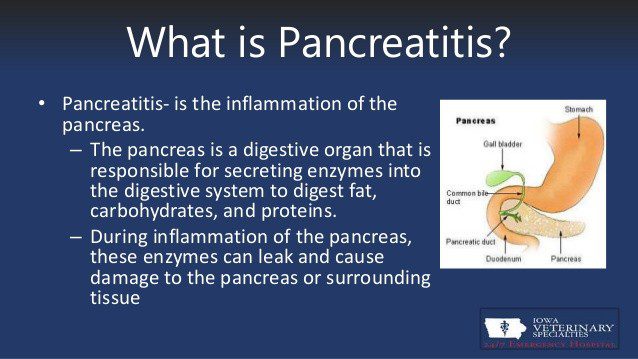Contents
Pancreatitis: what is it?
La pancreatitis is inflammation of the pancreas. the pancreas is a gland located behind the stomach, near the liver, which produces enzymes necessary for digestion and hormones that help regulate sugar (glucose) in the blood. Pancreatitis causes damage to the pancreas and surrounding tissues.
There are two forms of pancreatitis:
- Acute pancreatitis occurs suddenly and lasts for several days. The majority of cases occur as a result of gallstones or because of excessive alcohol consumption.
- Chronic pancreatitis Often occurs after an episode of acute pancreatitis and can last for several years.
Causes of pancreatitis
The majority of cases of acute pancreatitis are caused by gallstones or excessive alcohol consumption. Consumption of fatty foods, infection (such as mumps or viral hepatitis), problems after surgery, trauma to the abdomen, or cancer of the pancreas can cause acute pancreatitis. Some medicines, for example an antiparasitic such as pentamidine (Pentam®), didanosine (Videx®), used for HIV treatments or diuretics and sulfonamides can also cause acute pancreatitis. About 15% to 25% of cases of acute pancreatitis have an unknown cause.
About 45% of cases of chronic pancreatitis are caused by prolonged alcohol consumption, leading to damage and calcification in the pancreas. Other factors, such as inherited pancreatic disorders, cystic fibrosis, lupus, high triglyceride levels can cause chronic pancreatitis. About 25% of cases of chronic pancreatitis have an unknown cause.
Complications of pancreatitis
Pancreatitis can cause serious problems:
- Respiratory disorders. Acute pancreatitis can lead to respiratory failure, which can cause a drop in the level of oxygen in the blood which can be dangerous.
- Diabetes. Chronic pancreatitis can cause damage to insulin-producing cells, which can lead to diabetes.
- Infection. Acute pancreatitis can make the pancreas vulnerable to bacteria and infections. An infection of the pancreas can be serious and requires surgery to remove the infected tissue.
- Renal failure. Acute pancreatitis can cause kidney failure which, if it becomes severe and persistent, should be treated with dialysis.
- Malnutrition. Acute and chronic pancreatitis can prevent the pancreas from making the enzymes necessary for nutrient absorption. It can lead to malnutrition, diarrhea, and weight loss.
- Pancreatic cancer. Prolonged inflammation of the pancreas caused by chronic pancreatitis is a risk factor for developing pancreatic cancer.
- Pancreatic cyst. Acute pancreatitis can cause fluid or debris to build up in cyst-like pouches in the pancreas. A ruptured cyst can cause complications, such as internal bleeding and infection.
Diagnosis of pancreatitis
Blood tests can confirm acute pancreatitis by the presence of high levels of digestive enzymes (amylase and lipase), sugars, calcium or lipids (fats).
A CT scan can be used to identify swelling of the pancreas, fluid buildup in the abdomen, or the presence of pseudocysts.
Magnetic resonance imaging (MRI) and computed tomography can be used to detect the presence of gallstones in the gallbladder.










